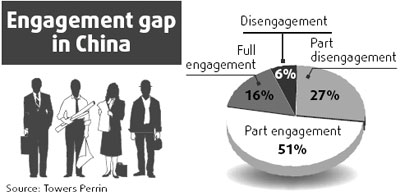Staff put learning, career development first
Learning and career development opportunities are the key factors for Chinese when they look for a job and decide to stay with that employer. But many employees say management doesn't do enough to keep them fully engaged and contributing to their organization.
That's according to the 2007 Towers Perrin Global Workforce Study, a survey of nearly 90,000 workers in 18 countries and regions - including 5,000 employees on the mainland.
The survey found a significant disconnect between what senior leaders say and what employees perceive they are actually doing. Less than half the employees polled believe senior management is interested in the well-being of staff, and likewise only 48 percent believe they are getting open and honest communication from senior management.

There is a gap, according to the study, between the energy and commitment employees want to invest in their company and the ability of the organization to make the most of its staff.
The study showed that companies with the highest levels of employee engagement achieve better financial results and are more successful in retaining their most valued staff than companies with lower levels of engagement. Employee engagement is the measure of people's willingness and ability to put in discretionary effort at work. It's broken down into rational, emotional and motivational categories.
Chinese consider non-cash benefits such as "learning and development opportunities" and "career advancement opportunities" are the most important factors when they decide to join and stay with a company. They see "career advancement opportunities" as the top engagement driver. However, only 41 percent believe their employers provide these benefits.
Only 16 percent of the Chinese employees surveyed were fully engaged in their work - meaning they are willing to go the extra mile to help their company succeed. Meanwhile, 33 percent said they were partly to fully disengaged - meaning they invest as little energy as possible in their job and are probably looking for another one.
The gap - dubbed the "engagement gap" by Towers Perrin - is leading to a high level of mobility and a low level of efficiency among many companies, as 68 percent of employees surveyed in China are either actively looking for another job, considering another offer, or have already made plans to leave their current job.
"In the world's fastest-growing economy, learning and obtaining new skill sets is the top priority for Chinese employees as a means to help them stay competitive and employable in the market and people are eager to grow together with the company," said Michael Chan, a senior consultant at Towers Perrin HR Services.
"Competitive pay can get talent in the door, but an employer's commitment to providing sufficient learning and career development opportunities is the key to retaining high-potential employees and driving them to make significant contributions to the organization," he said.
Leadership is also a key factor globally in employee engagement, according to the study. Eight of the top 10 drivers for employee engagement in China revolve around organization and leadership, such as "an organization encourages innovative thinking" and "senior management's values are consistent with actions".
"An organization's reputation for social responsibility" is the top retention driver, according to the survey.
"In China's rapidly changing environment, employees want to know where their companies and careers are going. Leaders and managers need to improve their management skills to better engage their people through communication, transparency and innovation," Chan said.
"Leaders also need to ensure that the company's mission, vision and values are aligned with the company's business and people strategies."
(China Daily 12/14/2007 page15)














